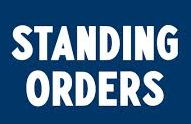Indian Legal System > Civil Laws > Labour Laws > Industrial Employment Act (Standing Orders), 1946 > Framing Standing Orders
In this article, we shall study the provisions in the Industrial Employment (Standing Orders) Act, 1946, for framing Draft Standing Orders.
Sections 3 to 10 of the Industrial Employment (Standing Orders) Act, 1946 lays down the procedure for submission of draft standing orders, the conditions for certification and the issue of the certified standing orders. It also details the procedure for the modification of the certified standing orders duly making provision for appeals for the grievances arising out of the standing orders.
Framing of Standing Orders:
Section 3 and 4 deals with framing and submission to Certifying Authority of draft Standing Orders
Section 3: The Industrial Employment (Standing Orders) Act:
Submission of draft standing orders.—
(1) Within six months from the date on which this Act becomes applicable to an industrial establishment, the employer shall submit to the Certifying Officer five copies of the draft standing orders proposed by him for adoption in his industrial establishment.
(2) Provision shall be made in such draft for every matter set out in the Schedule which may be applicable to the industrial establishment, and where model standing orders have been prescribed, shall be, so far as is practicable, in conformity with such model.
(3) The draft standing orders submitted under this section shall be accompanied by a statement giving prescribed particulars of the workmen employed in the industrial establishment including the name of the trade union, if any, to which they belong.
(4) Subject to such conditions as may be prescribed, a group of employers in similar industrial establishments may submit a joint draft of standing orders under this section.
According to Section 3 Sub-Section (1), within six months from the date on which the Act becomes applicable to an industrial establishment, the employer shall submit to the Certifying Officer five copies of the proposed Standing Orders proposed by him for adoption in his industrial establishment.
According to Section 3 Sub-Section (2), a provision shall be made in such draft for every matter set out in the Schedule which may be applicable to the industrial establishment, and where model standing orders have been prescribed, shall be, so far as practicable, in conformity with such model.
According to Section 3 Sub-Section (3), the draft standing orders submitted under Section 3 shall be accompanied by a statement giving prescribed particulars of the workmen employed in the industrial establishment including the name of the trade union, if any, to which they belong.
According to Section 3 Sub-Section (4), a group of employers in similar industrial establishments may submit a joint draft of standing orders under Section 3 of the Act satisfying such conditions as may be prescribed.
In Engineering Workers Union .V. Appellate Authority, (1965) 1 LLJ.350 case, the Court held that according to Section 3(2) of the Act the draft Standing Orders shall have provision for every matter set out in the Schedule and where model standing orders are prescribed, the draft standing orders must as far as is practicable, be in conformity with such model. Hence if the draft standing orders are not in conformity with the model standing orders where it is prescribed, the employer shall show the reasons thereof. The Act empowers the Certifying Officer or the Appellate Authority to enquire into the “impracticability” to follow the model standing orders and also adjudicate upon the fairness and reasonableness of the draft standing orders.
Conditions for Certification of Standing Orders:
Section 4: The Industrial Employment (Standing Orders) Act:
Conditions for certification of standing orders.
Standing orders shall be certifiable under this Act if—
(a) provision is made therein for every matter set out in the Schedule which is applicable to the industrial establishment, and
(b) the standing orders are otherwise in conformity with the provisions of this Act; and it shall be the function of the Certifying Officer or appellate authority to adjudicate upon the fairness or reasonableness of the provisions of any standing orders.
According to Section 4, Standing Orders shall be certifiable under the Act if a provision is made in the draft Standing Orders for every matter set out in the Schedule and thereupon it shall be the duty of the Certifying Officer or Appellate Authority to adjudicate upon the fairness or reasonableness of the provisions of the draft Standing Orders.
In Hindustan Lever v. Workmen,”AIR 1975 SC 145 case, the Standing Orders had a provision of transfer of an employee from one department to another of the same establishment at the discretion of management, provided that terms and conditions remain unchanged. Certain workmen challenged their transfer on the plea that it was done with, mala fide intention. It was held by the Court that transfer is valid and the burden of proving it invalid lies with the workmen.
In M.K.E. Association vs. Industrial Tribunal. AIR 1959 Mysore 235 case, the Court held that the draft order to be valid, should contain every matter specified in the Act, along with the additional matter prescribed by’ the government, applicable to the industrial/commercial establishment.
In M.K.E. Association vs. Industrial Tribunal. AIR 1959 Mysore 235 and ACC v. P.P. Vyas AIR 1960, SC 665 cases, the Court held that the conformity cannot be equated with identity. Thus, it can be said that the draft Standing Orders need not have identical wording as found in the Standing Orders Act, what it means is that its subject matter must conform to the model provided by the government. The expression “as far as possible” indicates that the appropriate authority may permit departure from the model Standing Orders, if it is satisfied that Insistence upon such conformity may be impracticable.
Previous Topic: Meaning of Standing Orders
Next Topic: Draft Standing Orders (Certification)
